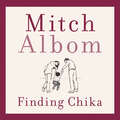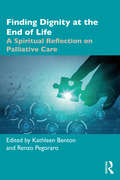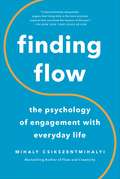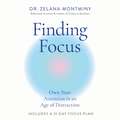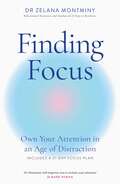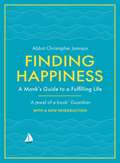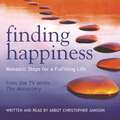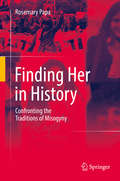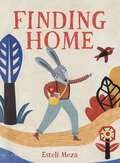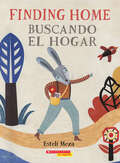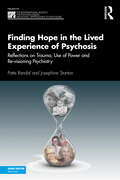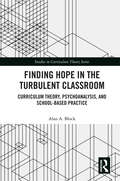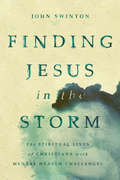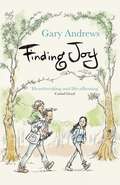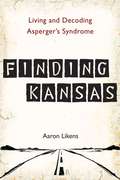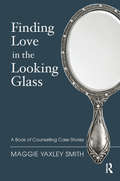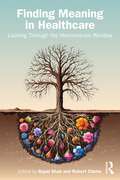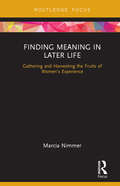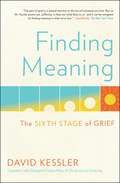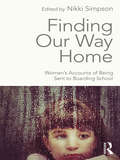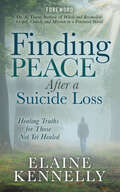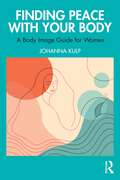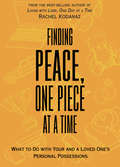- Table View
- List View
Finding Chika: A heart-breaking and hopeful story about family, adversity and unconditional love
by Mitch AlbomChika Jeune was born three days before the devastating earthquake that decimated Haiti in 2010. She spent her infancy in extreme poverty, and when her mother died giving birth to a baby brother, Chika was brought to the Have Faith Haiti Orphanage that Mitch and his wife, Janine operate.Chika's arrival made a quick impression. Brave and self-assured, even as a three-year-old, she delighted the other kids and teachers. But at age five, Chika was suddenly diagnosed with a terminal disease that no doctor in Haiti could help with.Mitch and Janine took Chika to America, hoping that treatment there would enable her to go back home. Instead, Chika became a permanent part of their lives, as they embarked on a two-year, around-the-world journey to find a cure. As Chika's boundless optimism and humour taught Mitch the joys of caring for a child, he learnt that a relationship built on love, no matter what blows it takes, can never be lost.This is Mitch Albom at his most poignant, powerful and personal. Chika is a celebration of a girl, her adoptive guardians, and the incredible bond they formed - a devastatingly beautiful portrait of what it means to be a family, regardless of how it is made.
Finding Dignity at the End of Life: A Spiritual Reflection on Palliative Care
by Kathleen D. Benton Renzo PegoraroFinding Dignity at the End of Life discusses the need for palliative care as a human right and explores a whole-person methodology for use in treatment. The book examines the concept of palliative care as a holistic human right from the perspective of multiple aspects of faith, ideology, culture, and nationality. Integrating a humanities-based approach, chapters provide detailed discussions of spirituality, suffering, and healing from scholars from around the world. Within each chapter, the authors address a different cultural and religious focus by examining how this topic relates to questions of inherent dignity, both ethically and theologically, and how different spiritual lenses may inform our interpretation of medical outcomes. Mental health practitioners, allied professionals, and theologians will find this a useful and reflective guide to palliative care and its connection to faith, spirituality, and culture.
Finding Flow: The Psychology Of Engagement With Everyday Life
by Mihaly CsikszentmihalyiFrom one of the pioneers of the scientific study of happiness, an indispensable guide to living your best life.What makes a good life? Is it money? An important job? Leisure time? Mihaly Csikszentmihalyi believes our obsessive focus on such measures has led us astray. Work fills our days with anxiety and pressure, so that during our free time, we tend to live in boredom, watching TV or absorbed by our phones.What are we missing? To answer this question, Csikszentmihalyi studied thousands of people, and he found the key. People are happiest when they challenge themselves with tasks that demand a high degree of skill and commitment, and which are undertaken for their own sake. Instead of watching television, play the piano. Take a routine chore and figure out how to do it better, faster, more efficiently. In short, learn the hidden power of complete engagement, a psychological state the author calls flow. Though they appear simple, the lessons in Finding Flow are life-changing.
Finding Focus: Own Your Attention in an Age of Distraction
by Dr Zelana Montminy'Finding Focus is an essential read for our distracted times' - Dr Mark Hyman'Filled with helpful applications and science-packed insights, this practical guide to improving our mental focus empowers us to create real changes in our daily lives that can improve our mental and physical health' - Dr Daniel J. SiegelOur brains are wired for focus. We are designed for it, we crave it, and yet in our current age of overload we too often feel like our minds are bolting from one distraction to the next, with sustained focus always just out of reach.Finding Focus is an empowering guide to reclaiming your most precious resource: your attention. Leading behavioural scientist Dr Zelana Montminy unveils the science behind focus and distraction, revealing how our hyperconnected reality and the endless flux between digital and physical life fragments our thoughts and diminishes our well-being.The good news? Your brain is more adaptable than you think. Finding Focus equips you with powerful strategies to:* Silence the noise: Learn to manage distractions and cultivate an environment that fosters deep concentration.* Rewire your brain: Discover the science of neuroplasticity and harness its power to train your brain for sustained focus.* Unleash your potential: Reclaim the ability to connect meaningfully, contribute authentically, and shape the life you desire.* Rediscover yourself: Fuel your curiosity, creativity, and capacity for joy.Focus is key to our ability to do good work, but it's connected to so much more than just efficiency or productivity. When our rest is punctured by email notifications we feel exhausted; when family time is disrupted by multitasking we seem disconnected from each other; when creative space is drained away by the lure of other priorities, we feel empty. But if we can control our attention and be present, if we choose when and how we engage, we have a greater sense of wellbeing, deeper fulfillment, and a clear purpose. Finding Focus invites you to ask the question 'Where do I want to direct my focus today?' and supports you on your journey to reclaiming your attention and curating the life you want to lead. It is a call to arms for anyone yearning to break free from the grip of distraction and live a life brimming with purpose and connection.
Finding Focus: Own Your Attention in an Age of Distraction
by Dr Zelana Montminy'Finding Focus is an essential read for our distracted times' - Dr Mark Hyman'Filled with helpful applications and science-packed insights, this practical guide to improving our mental focus empowers us to create real changes in our daily lives that can improve our mental and physical health' - Dr Daniel J. SiegelOur brains are wired for focus. We are designed for it, we crave it, and yet in our current age of overload we too often feel like our minds are bolting from one distraction to the next, with sustained focus always just out of reach.Finding Focus is an empowering guide to reclaiming your most precious resource: your attention. Leading behavioural scientist Dr Zelana Montminy unveils the science behind focus and distraction, revealing how our hyperconnected reality and the endless flux between digital and physical life fragments our thoughts and diminishes our well-being.The good news? Your brain is more adaptable than you think. Finding Focus equips you with powerful strategies to:* Silence the noise: Learn to manage distractions and cultivate an environment that fosters deep concentration.* Rewire your brain: Discover the science of neuroplasticity and harness its power to train your brain for sustained focus.* Unleash your potential: Reclaim the ability to connect meaningfully, contribute authentically, and shape the life you desire.* Rediscover yourself: Fuel your curiosity, creativity, and capacity for joy.Focus is key to our ability to do good work, but it's connected to so much more than just efficiency or productivity. When our rest is punctured by email notifications we feel exhausted; when family time is disrupted by multitasking we seem disconnected from each other; when creative space is drained away by the lure of other priorities, we feel empty. But if we can control our attention and be present, if we choose when and how we engage, we have a greater sense of wellbeing, deeper fulfillment, and a clear purpose. Finding Focus invites you to ask the question 'Where do I want to direct my focus today?' and supports you on your journey to reclaiming your attention and curating the life you want to lead. It is a call to arms for anyone yearning to break free from the grip of distraction and live a life brimming with purpose and connection.
Finding Happiness: A monk's guide to a fulfilling life
by Father Christopher Jamison OSBAbbot Christopher Jamison from hit TV series THE MONASTERY, turns his attention to the eternal questions of how to be happy, and why we believe it is so important.Why is 'being happy' such an imperative nowadays? What meaning do people give happiness?In this book Abbot Christopher turns to monastic wisdom to offer answers, and to explain that in essence, happiness is a gift, not an achievement, the fruit of giving and receiving blessings.Following the same accessible and engaging format of FINDING SANCTUARY, Abbot Christopher takes different aspects of happiness, examines them, tells us what monastic wisdom has to say about them, and offers us steps towards our own journey to finding happiness.
Finding Happiness: A monk's guide to a fulfilling life
by Father Christopher Jamison OSBWhy is 'being happy' such an imperative nowadays? What meaning do people give happiness?In this book Abbot Christopher turns to monastic wisdom to offer answers, and to explain that in essence, happiness is a gift, not an achievement, the fruit of giving and receiving blessings.Following the same accessible and engaging format of FINDING SANCTUARY, Abbot Christopher takes different aspects of happiness, examines them, tells us what monastic wisdom has to say about them, and offers us steps towards our own journey to finding happiness.Read by Christopher Jamison(p) 2008 Orion Publishing Group
Finding Her in History
by Rosemary PapaThis monograph was cultivated from the AERA SIG, Women in Education 2016 address and delivers a brief review of his-story in terms of the lack of her-story being included through three parallel lines: 1) historical documents on formation of the family and work in and outside the home from the Paleolithic era; 2) the development of traditional religions and the subjugation of women beginning with the conniving seductress Eve; and, 3) the discussion of major wars and the nation/state policies produced throughout history with impacts on girls and women, as well, the precarious health of the planet. This brief review of his-story reveals the continued exclusion of her-story with the example of Willystine Goodsell, a historian, ironically erased from history in education. The premise that subjugation of women and children as lesser than males has been supported both in the name of protecting them and in shaming them. The combined ubiquitous effects of disequilibrium created by mankind in wars, religions, education, social capital, economics and politics, have ensured his-story is the one recorded. This monograph suggests a more balanced approach to the written her-his-story requires inclusion of all the population and the secular educating of especially girls and women.
Finding Home (Ebook)
by Estelí MezaA powerful socio-emotional picture book about friendship and courage in the face of hardship.When Conejo's house blows away in a storm, his friends and neighbors take turns helping him look for it. Though they do not find his house, they each send him on his way with good cheer and small gifts. Conejo is grateful for their support, but still finds himself sitting with sadness for some time. When the rain clears, Conejo finds the courage to rebuild. He fills his new home with the memories, love, and support he collected from his friends along the way.
Finding Home / Buscando el hogar
by Estelí MezaA powerful socio-emotional picture book about friendship and courage in the face of hardship.Cuando una tormenta se lleva la casa de Conejo, este sale a buscarla con la ayuda de sus amigos, quienes le ofrecen cariño y apoyo. Aun así, Conejo se siente muy triste y se sienta a reflexionar un rato. Sin embargo, cuando cesa la lluvia, está listo para encontrar su camino.When Conejo's house blows away in a storm, he sets off to find it with the help of his friends. They give him lots of love and support, but even so, Conjeo finds himself feeling sad. So Conejo sits with sadness for some time, and when the rain has cleared, he feels ready to find his way.
Finding Hope in the Lived Experience of Psychosis: Reflections on Trauma, Use of Power and Re-visioning Psychiatry (The International Society for Psychological and Social Approaches to Psychosis Book Series)
by Patte Randal Josephine StantonThis book offers first-person accounts of the experience of psychosis from the inside and the outside, through the eyes of two doctors, one of whom has experienced psychosis and both of whom have worked for decades in the field of psychiatry. Underpinned by rigorous academic analysis using an evocative duo-ethnographic approach, the book explores the cultural and subcultural influences from childhood onwards – both traumatic and resilience-building – that have shaped their lives. Both authors reflect on strategies they learned early in life for dealing with challenges, each managing to function at a high level while avoiding awareness of their vulnerability. They reflect on the potential dangers of using their expertise and position of power in psychiatry simply to diagnose mental illness and prescribe medication. The differences and similarities in the authors’ stories provide a productive tension highlighting the complexities of this paradigm shift that is happening in psychiatry. Written in the form of two interacting memoirs, this book is of great interest to researchers, clinicians, and practicing psychologists, as well as a general audience with interest in psychosis.
Finding Hope in the Turbulent Classroom: Curriculum Theory, Psychoanalysis, and School-Based Practice (Studies in Curriculum Theory Series)
by Alan A. BlockThis book explores the practical and psychological factors that regulate teaching and learning in the classroom, and illustrates how hope and creativity may arise out of unforeseen, non-standard, or turbulent conditions. Written at the intersection of curriculum theory and psychoanalysis, this volume offers an original pedagogical stance that seeks to ameliorate the impact of the classroom’s regulated and standardized environment. The author’s approach to classroom education suggests that teachers investigate students’ psychological entanglements to explain and transform difficult classroom experiences into productive, educative ones. By promoting an ethos of ironic engagement in teaching and learning, this book also demonstrates the importance of playfulness, imagination, and a readiness to make mistakes in classroom settings. This book will be of great interest to graduate and postgraduate students, researchers, academics, and policy makers in the fields of curriculum studies, teacher education, educational psychology and classroom management.
Finding Jesus in the Storm: The Spiritual Lives of Christians with Mental Health Challenges
by John SwintonPeople living with mental health challenges are not excluded from God&’s love or even the fullness of life promised by Jesus. Unfortunately, this hope is often lost amid the well-meaning labels and medical treatments that dominate the mental health field today. In Finding Jesus in the Storm, John Swinton makes the case for reclaiming that hope by changing the way we talk about mental health and remembering that, above all, people are people, regardless of how unconventionally they experience life. Finding Jesus in the Storm is a call for the church to be an epicenter of compassion for those experiencing depression, schizophrenia, bipolar disorder, and related difficulties. That means breaking free of the assumptions that often accompany these diagnoses, allowing for the possibility that people living within unconventional states of mental health might experience God in unique ways that are real and perhaps even revelatory. In each chapter, Swinton gives voice to those experiencing the mental health challenges in question, so readers can see firsthand what God&’s healing looks like in a variety of circumstances. The result is a book about people instead of symptoms, description instead of diagnosis, and lifegiving hope for everyone in the midst of the storm.
Finding Joy
by Gary Andrews'Perhaps the sweetest and most poignant book of the year . . . It's often said that men don't talk about their feelings enough: this widowed father has doodled about them instead, and the result is more eloquent than any words' DAILY MAIL, BOOKS OF THE YEARWhen his wife, Joy, died very suddenly, a daily drawing became the way Gary Andrews dealt with his grief.From learning how to juggle his kids' playdates and single-handedly organising Christmas, to getting used to the empty side of the bed, Gary's honest and often hilarious illustrations have touched the hearts of thousands on social media. Finding Joy is the story of how one family learned to live again after tragedy.An uplifting, funny and beautifully illustrated journey to hope, for fans of Charlie Mackesy's The Boy, the Mole, the Fox and the Horse, and Raymond Briggs' Ethel & Ernest
Finding Joy: 101 Ways to Free Your Spirit and Dance with Life
by Charlotte Davis KaslFrom the book jacket: In Finding Joy, Charlotte Davis Kasl offers her readers an insightful, spiritual, yet light-hearted guide for bringing perspective and balance to life. She takes us on a path to joy that includes playfulness, creativity, honesty, and self-acceptance. Instead of being immersed in life's dramas, she helps us dance lightly with them, bringing a sense of fascination to our lives as they unfold. Through a wealth of creative and playful strategies she helps us release fear, self-criticism, buried feelings, and shame, and accept ups and downs as a natural part of life. From this perspective we are able to relax and be open to solutions and alternatives that seldom come when we are tense, serious, or immersed in blame. She also shows how the positive power of joy can help us bridge differences between groups of people, help us find our common bonds and lead to a more peaceful world. This positive, realistic book helps the reader tap into the wonder and wisdom within us and around us. Whether we are struggling with depression, coping with everyday difficulties, or simply wanting more joy, this is a welcome guide to help us free our spirits and dance with life.
Finding Kansas: Living and Decoding Asperger's Syndrome
by Aaron LikensAll I want is someone to care, to know, to understand. And maybe, for a brief moment, I will be free. . . Finding Kansas is a memoir like no other, written by an unlikely author who at first never dreamed he would find even one reader. When he was diagnosed with Asperger's syndrome at age 20, Aaron Likens began to collect his thoughts and experiences on paper-the highs, the lows, the challenges, and the unexpected joys. What he found was hope -- not only for himself, but also for others with Asperger's. Now a sought-after speaker and blogger, he is passionate about sharing his insights into this often misunderstood condition. Aaron has another passion, too: the world of auto racing. A successful flag man at racing events across the country, Aaron calls racing his Kansas-a place where he feels safe, confident, and normal. For others on the autism spectrum, Kansas might be trains, history, or the weather. It is here where, like Aaron, they find freedom, and the possibility for growth and change Finding Kansas brings us into Aaron's world and, in the process, offers a richly observed, deeply thoughtful, and sometimes painful picture of what it's like to live on the autism spectrum.
Finding Love in the Looking Glass: A Book of Counselling Case Stories
by Maggie Yaxley SmithThis book shows how people can make different choices in their lives once they find a level of self-acceptance and realistic goals, presenting various case stories that show what can be achieved in counselling and how the counselling relationship can enable people to change their lives.
Finding Meaning in Healthcare: Looking Through the Hermeneutic Window
by Robert Clarke Rupal Shah P. Syam PrasadThis pioneering book illustrates the ways in which an interpretive or hermeneutic stance can be incorporated into modern healthcare across clinical practice, clinical ethics, education and leadership – and the transformative effects of doing so.Combining practical case studies and narrative, this book introduces the hermeneutic window, in which meaning making frames clinical and educational decision making. It shows how best practice requires more than clinical knowledge, communication skills and application of evidence based medicine. It is within the hermeneutic window that assumptions, meanings and values are examined, questioned and re-examined. Drawing on a wide range of expertise, the chapters challenge existing assumptions about the essence of healthcare and the role that clinicians play within it.This book is valuable reading for all healthcare practitioners, particularly GPs, physicians, psychiatrists and psychologists, as well as professions allied to medicine, medical students and other trainees.
Finding Meaning in Later Life: Gathering and Harvesting the Fruits of Women’s Experience
by Marcia NimmerFinding Meaning in Later Life: Gathering and Harvesting the Fruits of Women’s Experience is an exploration in understanding the psychological tasks inherent for women in creating and maintaining purpose as they mature and enter their later years. With ever-increasing lifespan for elders, it becomes important for a society that glorifies youth to meet the challenges of this developmental milestone. Many books and articles on post-midlife are written from a biological and behavioral stance—with quantitative data supporting concrete lifestyle recommendations for "successful aging." Using this lens, successful aging is often defined as having good to excellent health, no disabilities in activities of daily living, good cognitive functioning, and living in the community. That "received wisdom" leads to the conundrum that the only path to successful aging is by not aging! This book challenges current thoughts on aging, expanding our perspective such that purpose and meaning in later years derives from inner resources that are not dependent on biological and physical states of being. Its conclusions stem from the direct experience and voices of mature women, obtained through qualitative research. The results of this study shed light on existential theories, bringing them to life with added weight and traction. Ultimately, the ideas explored here unfold as a map to navigate this often-misunderstood stage in life.
Finding Meaning: The Sixth Stage of Grief
by David KesslerIn this groundbreaking and &“poignant&” (Los Angeles Times) book, David Kessler—praised for his work by Maria Shriver, Marianne Williamson, and Mother Teresa—journeys beyond the classic five stages to discover a sixth stage: meaning.In 1969, Elisabeth Kübler-Ross first identified the stages of dying in her transformative book On Death and Dying. Decades later, she and David Kessler wrote the classic On Grief and Grieving, introducing the stages of grief with the same transformative pragmatism and compassion. Now, based on hard-earned personal experiences, as well as knowledge and wisdom gained through decades of work with the grieving, Kessler introduces a critical sixth stage: meaning. Kessler&’s insight is both professional and intensely personal. His journey with grief began when, as a child, he witnessed a mass shooting at the same time his mother was dying. For most of his life, Kessler taught physicians, nurses, counselors, police, and first responders about end of life, trauma, and grief, as well as leading talks and retreats for those experiencing grief. Despite his knowledge, his life was upended by the sudden death of his twenty-one-year-old son. How does the grief expert handle such a tragic loss? He knew he had to find a way through this unexpected, devastating loss, a way that would honor his son. That, ultimately, was the sixth stage of grief—meaning. In Finding Meaning, Kessler shares the insights, collective wisdom, and powerful tools that will help those experiencing loss. &“Beautiful, tender, and wise&” (Katy Butler, author of The Art of Dying Well), Finding Meaning is &“an excellent addition to grief literature that helps pave the way for steps toward healing&” (School Library Journal).
Finding My Way: The intimate and revelatory new memoir on growing up, first love and mental health from the global icon
by Malala YousafzaiThis is not the story you think you know. It's the one I've been waiting to tell.How do you rebuild yourself when your whole world changes overnight? Thrust onto the public stage at fifteen years old after the Taliban's brutal attack on her life, Malala quickly became an international icon known for bravery and resilience. But away from the cameras and crowds, she spent years struggling to find her place in an unfamiliar world. Now, for the first time ever, Malala takes readers beyond the headlines in Finding My Way - a vulnerable, surprising memoir that buzzes with authenticity, sharp humour and tenderness.Finding My Way is a story of friendship and first love, of anxiety and self-discovery, of trying to stay true to yourself when everyone wants to tell you who you are. In it, Malala traces her path from high school loner to reckless college student to a young woman at peace with her past. Through candid, often messy moments like nearly failing exams, getting ghosted and meeting the love of her life, Malala reminds us that real role models aren't perfect - they're human. In this astonishing memoir, Malala reintroduces herself to the world, sharing how she navigated life as someone whose darkest moments threatened to define her - while seeking the freedom to find out who she truly is. Finding My Way is an intimate look at the life of a young woman taking charge of her destiny - and a deeply personal testament to the strength it takes to be unapologetically yourself.'[A] messy, endearingly awkward and disarmingly relatable coming-of-age . . . This is Malala unfiltered, and she makes courage feel like something we can all reach for' OPRAH DAILY
Finding Our Way Home: Women's Accounts of Being Sent to Boarding School
by Nikki SimpsonFinding Our Way Home: Women’s Accounts of Being Sent to Boarding School shares the personal stories of sixteen women, all of whom were sent away to board at an early age. Their accounts delve into the depths of long suppressed emotions and feelings, and the lifelong impact that the early separation from their families has had. Much has been written about the impact of ‘boarding school syndrome’ on male boarders, but less about their female counterparts. This book is the first to explore the experience from a purely female perspective, and offers an intriguing insight into the world of boarding schools and the upbringing of girls born in the mid-to-late 20th century. Finding Our Way Home is a book for everyone who ever attended boarding school, as well as psychotherapists and counsellors working with boarding school survivors.
Finding Peace After a Suicide Loss: Healing Truths for Those Not Yet Healed
by Elaine KennellyA Christian guide to grieving and healing after the suicide of a loved one, written from a personal perspective.In Finding Peace After a Suicide Loss, Elaine Kennelly shares the story of her eighteen-year-old son’s tragic death, opening up about the shattering blow and immediate anguish. Written in a format of then and now, the book courageously tackles the spiritual battles which face every suicide survivor: guilt, shame, rejection, blame, and stigma. The book is also not afraid to ask the question, “Why God? Why?”It took years for Elaine to start moving forward. Even then, her journey was made in baby-steps of love, prayer, forgiveness, obedience, and service. But there is victory to celebrate, as Finding Peace After a Suicide Loss shows the way to joy, real joy in a marriage that stays intact and a family that’s close at hand. Overcoming a suicide loss is possible — let Finding Peace After a Suicide Loss show you how.
Finding Peace with Your Body: A Body Image Guide for Women
by Johanna KulpFinding Peace with Your Body weaves together the author’s personal story as well as her work as a psychotherapist to create an interactive self-help guidebook to help readers find harmony with their bodies. This is an interactive book with a fresh perspective that encourages the reader to dive deeper into their own personal history and use this book as a place to journal and complete specific homework instructions to change their relationship with their body. This book includes personal anecdotes, theoretical orientation and specific clinical intervention in a way that helps the reader understand context, personal experience and the ability to create direct behavioral and cognitive change in their life. The journey map includes not only reflective prompts but also weaves in historical context regarding the subjugation of women’s bodies throughout time. Organized so that it can be used by individuals or practitioners assisting their clients along the journey of recovery from an eating disorder, this book offers readers hope, practical tools and a road map for working through specific body image issues with practical skills and therapeutic interventions.
Finding Peace, One Piece at a Time: What To Do With Your and a Loved One's Personal Possessions
by Rachel KodanazPersonal possessions tell a beautiful story of a person's life. Finding Peace, One Piece at a Time helps to capture and share these stories by providing tools for how to thin, repurpose, and redistribute these possessions so they continue to be with us today and for future generations. In the digital era, personal possessions include not only physical objects but also the accumulated data of a lifetime. These physical and digital footprints combine into an extension of ourselves and what we signify. Finding a new home for these items helps maintain a connection to those who are no longer physically with us. Their possessions embody memories that should be saved, shared, and treasured in the hands of those who want to forever be connected.
